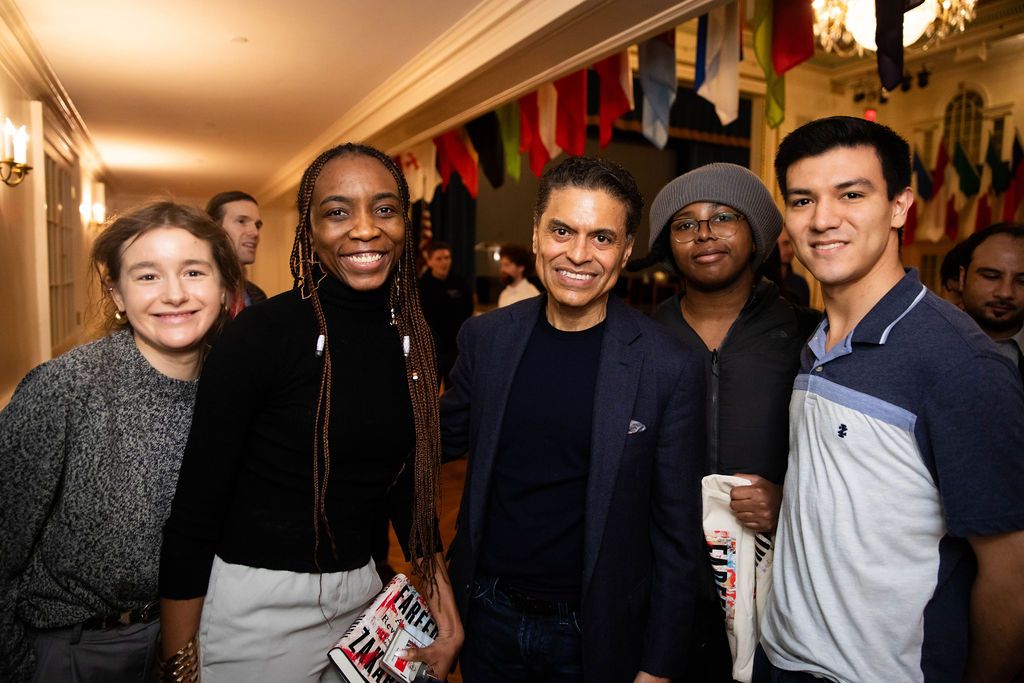
Fareed Zakaria Discusses Today’s “Wild and Unruly World”
On April 3rd, the International House community went “Around the World with Fareed Zakaria,” as the CNN journalist and longtime Trustee described the current unraveling of a US-led international order that has prevailed since the end of World War II.
The event drew a packed audience in Davis Hall eager to hear one of the world’s foremost commentators on international affairs.
Speaking the day after US President Donald Trump proclaimed “Liberation Day,” announcing historic global tariffs, Zakaria delved deeply into the historical factors which have led to the current moment, and the potential consequences going forward.
Exploring the arc of American foreign policy, global power shifts, and themes from his recent book, Age of Revolutions: Progress and Backlash from 1600 to the Present.
Zakaria painted a sobering portrait of today’s geopolitical landscape, drawing sharp distinctions between past and present U.S. leadership styles.
He described a political climate increasingly defined by personality cults, alternative realities, and the erosion of truth—a shift he called “the most Orwellian” moment in modern American life. The loyalty demanded by such movements, he warned, prioritizes narrative over fact and destabilizes democratic norms.
Zakaria encouraged I-House residents to take the long view of U.S. history and influence. From an economic standpoint, he noted that the United States has consistently outperformed global competitors, even as fears of decline dominate public discourse. He reminded listeners that skepticism toward globalization and free trade is not new, but now sits at the core of a transformed political ideology.
Offering a wide-angle view of global trends, Zakaria discussed America’s shifting role on the world stage. He questioned whether longtime allies could still count on U.S. support, particularly in light of wavering commitments to NATO. Comparing postwar liberalism to today’s fractured political landscape, he reflected on how nationalist and protectionist impulses have weakened multilateral cooperation.
Domestically, Zakaria examined the cultural and economic divides fueling polarization in the United States. He highlighted rural-urban tensions, educational divides, and the rise of what he termed “symbolic animus”—the manipulation of language and grievance for political ends. Rather than healing class rifts, he argued, this rhetoric deepens them. Drawing on examples from Europe, he suggested that strong public investment in health care and infrastructure can make economic status less determinative of quality of life.
Universities also came under scrutiny in Zakaria’s remarks. He criticized higher education institutions for straying from their core mission and for inconsistent responses to national and global events, including the murder of George Floyd and the conflict in Gaza. He called for more principled engagement with issues of freedom of expression and identity, particularly when those issues involve Jewish students and alumni.
Returning to the international sphere, Zakaria lamenting the gutting of American-led global aid programs such as USAID. He warned against ceding influence to authoritarian models and emphasized the human cost of indifference—particularly in under-resourced regions of the world. Reflecting on his childhood in India and the values instilled by early encounters with American ideals, he reminded the audience that global leadership must be guided by a moral compass as well as strategic interest.
“Doing the right thing,” Zakaria said, “even when it’s hard, is what brings us back.”
The evening concluded with a robust Q&A moderated by President Sebastian Fries, in which attendees engaged Zakaria on questions of diplomacy, education, and the evolving role of the United States in an increasingly unruly world.
